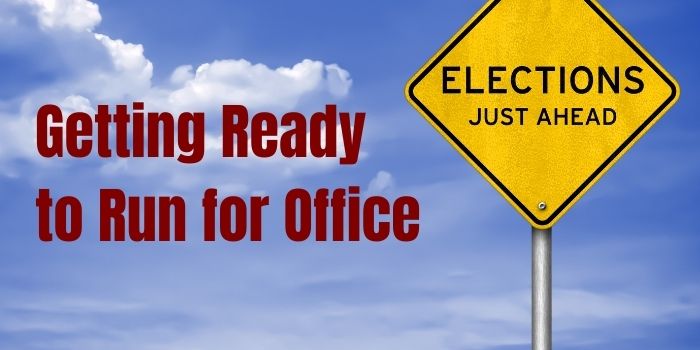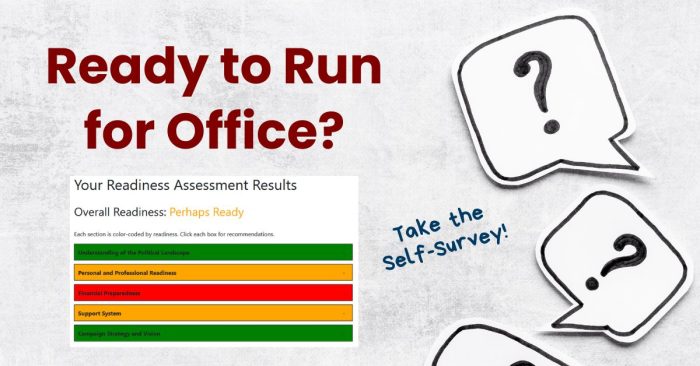Running for elected office is one of the best ways you can give back to your community. Whether you want to run for city council, mayor, or even the school board, there are many reasons to give it a shot.
But getting yourself ready to be the ballot takes time, effort, and money. It takes personal sacrifice and extracts a toll not only from you but also from your family and close supporters.
Are you ready?
Free Tool: Are You Ready to Run for Office? Take a Self-Assessment Survey.
What to consider if you are thinking of running for office:
- Are you ready to get involved?
- What political office should you run for?
- Qualify to run
- Figure out how much the campaign will cost
- Is your family ready for scrutiny?
- Are you prepared for the realities of a political campaign?
- Start your run for local office
- File for candidacy
- Get your finances in order
- Start raising money and create a fundraising strategy
- Recruit volunteers and staff
- Learn the issues
- Public speaking and events
- Interact with your community and online
Listen to this post:
Are you ready to get involved in local government?
Local government has always been a hot topic in the United States. It has been seen as a way to get involved with your community and make a difference. Local government is not about voting on national issues but about making decisions that affect your daily life.
“Should I run for office?” That’s a question every potential candidate asks themselves at some point.
Politics isn’t for everyone. Some people may volunteer with an organization or work to advocate for an issue, but never consider participating in local or state government themselves.
But if you have reasons to think you can make a difference, go for it and run for something!
As a leader in your community, you’ll be in a position to bring about change and create a positive impact. Do you have the time and work ethic to get the job done? What are the goals for your elected position?
Every municipality has its own particular issues. Do you know what they are, and do you have ideas for dealing with them?
One way to find out what is happening is to attend local government meetings. Even as an observer, you’ll learn a lot about your current representatives and how they perform on the job. You’ll also get an idea of what local developments are happening and what may be coming in the near future.
Read the laws or bylaws that govern the responsibilities of the elected position you seek. Prepare ahead of time, and you will have a better idea of what to expect.
What political training opportunities exist?

Become educated about the election process! A number of organizations have programs, seminars, and courses for candidates so they can develop leadership and campaigning skills. These courses are also useful for community leaders, organizers, and advocates.
The organizational skills taught in these courses are not just meant for career politicians, but for anyone who wants to get involved in the electoral process. This includes citizens interested in learning more about the democratic process.
“All politics is local.” – Tip O’Neill, former Speaker of the United States House of Representatives.
What political office should you run for?
If you are interested in a public service position, it’s a good idea to research the different offices and pick one that fits your interests. The most common type of political office people are interested in is at the local level. This includes cities, towns, counties, and school districts. The position you choose should be one that suits your unique skills and experience. If you’re not sure, check the duties and requirements to see if you can see yourself filling the position.
Are you more interested in an executive or legislative position? Do you want to make laws or see that they are executed properly? What position would be the best fit for your background and experience?
- For example, if you have law enforcement experience, you might want to make a run for sheriff.
- If you are an educator, you may want to bring your expertise to your local school board.
- Are you an attorney or work in criminal justice? You may be qualified for a judicial position or as a district attorney.
- If you have particular professional experience, you may be qualified for a local board or district position, such as in a water district.
Running for local office is a great way to get your name out there, boost your public profile, and make connections. If you don’t intend on running for a higher office in the future, a local campaign can be a very rewarding experience.
Free Tips: Subscribe for free guides and updates from Online Candidate.
Popular elected positions for first-time candidates
Many people become interested in politics because they are inspired by specific issues like corruption or development. They want to make a difference in their communities by becoming an officeholder in their village, town, or city.
Here are elected positions that first-time candidates often run for:
- City Ward Member
- City Council
- Alderman
- Board of Education
- Assessor
- Town Clerk or other Town Offices
- County Legislature
- County Commissioners
- State Legislature
- County Coroner
- Local Judicial Offices – Civil and Criminal
- Special districts, authorities, boards, and commissions
Related: What Are Easiest Political Offices To Run For?
Find out the qualifications to run

To meet the basic candidate qualifications, there is always a residency and age requirement, in addition to other requirements. For example, if you are running for judge or sheriff, you may need specific training, professional experience, or educational degrees to be eligible.
If you meet the basic requirements, do you have the proper paperwork to get yourself on the ballot? Have you paid the filing fees and know the election calendar? The rules and procedures for elections vary by state, county, and even city. Missed deadlines can put you in danger of missing a primary ballot or even a general election.
Often, the position you’ll run for will be a currently available position. Do you think you can beat the entrenched incumbent? They often have the advantage of having won multiple election cycles, an established fundraising network, name recognition, and even franking privileges. If not, then you may want to run for a seat that is more winnable so that you have a better shot later in the next election cycle.
Again, the question comes down to the office you decide to seek and the reasons for doing so. If you haven’t gained experience at the local level, you’ll have a harder time getting elected to congress or state governor or legislator.
Tip: Before you begin, check your state election office and your local election office for specific rules regarding various positions. There may be specific residency, age, petition, and other requirements.
Ready to run? We offer campaign websites for candidates and political marketing services.
How much will your campaign cost?

Money (and lots of it) is the lifeblood of politics. When running for office, you must raise and spend a certain amount of money to get your message out and be competitive. If you don’t like calling on friends, family, and supporters for financial assistance, you better get used to it.
Consider talking with others who have previously run for a similar position to get an estimate of how much your race might cost. Put together a detailed budget as early as possible, using real vendor cost estimates. This will give you an idea of how much money you’ll need to meet or exceed your contribution goal.
“How can I run a campaign without money?” is a question that comes up often with new, inexperienced candidates. Running without money or a budget is no way to win. Ideas and a platform are great, but in the end, your goal is to raise money in order to spend it to build awareness and get votes.
Is your family ready for public scrutiny?
An election not only involves the candidate but also his or her family. Your home will become cluttered with literature, signs, and documents. The process will stress out your partner, and the needs of your children will be put aside. Talk with your family and friends. Let them know what changes are in store for them. Having them understand and be on board with your decision will help during the most demanding times.
Opponents will work to dig up anything embarrassing or damaging from your past. You can expect personal attacks through social media, where “trolls” hide behind screens to lob accusations in anonymity.
Every politician needs a base of support. Even if you are not a political ‘insider’, you can build your own network from personal friends, acquaintances, and people you know through organizations you belong to.
The smaller the race, the more important personal relationships can be. Local races are often won by just a handful of votes, with victory often coming down to who gets the most supporters to the polls. Personal connections can be a powerful motivator for getting out the vote.
Are you prepared for the realities of political campaigning?
Running for office is hard work. There are many things to think about and do before you can actively campaign. You have to research your opponents, figure out what your campaign platform is, how much money you will need, create a team of people to help you with everything from speech writing to strategy advice, raise funds, and more.
The campaigning process itself can be mentally and physically challenging. Are you ready and able to commit the time and personal resources necessary to participate? Canvassing, phone calling, fundraising, and events can take up an enormous amount of time and energy.
Do you have a thick skin and can you weather criticism from your opponent, the press, and segments of the public? Social media is constantly tough on politicians. Most have learned to weather, or at least tolerate, the attacks.
Anyone who has ever decided to run and serve has dealt with these issues. Rest assured that whether you win or lose your election, you will come away from the experience with a greater appreciation for the political system and all that goes with it.
Starting your political campaign the right way
Running a political campaign can be complex, and it is important to start the process early in order to make sure all the necessary steps are taken. Campaigns often begin with a focus on a specific issue or cause. This section will list some tips on how one can launch their own campaign.
First, you want to know what offices are available and open to serve. If it is your first time running, you may want to run for a position even if you have no experience in it. It’s a great way to work yourself up to higher positions.
For information on available positions, visit the website of your state’s secretary of state.You can search your state election office for information on state-wide voting guidance. You will also want to get a handle on state voting requirements and local voting information. Also, contact your local clerk for information on requirements and filing dates.
File for candidacy
Assuming you’ve met the eligibility requirements, you will need to submit your petitions, application forms, and filing fees to your county board of elections. If your filing is not submitted within the specified time frame, your petition will be considered late, and you won’t appear on the ballot.
- You can get voter file information and find out how many people are registered to vote in your district from your local board of elections or secretary of state’s office.
- Your local political party can give you access to additional resources such as voter demographics, address and email lists, and more.
Reach out to politicians in your party who have been elected and build a professional political network.
Related: Announcing Your Candidacy for Political Office
Get your campaign finances in order
To accept any political donations, you’ll need a checking account in your organization’s name. All income and expenses will need to be tracked and reported, per applicable law. A campaign committee is a legal business entity that you will need to create and register.
You will also need a way to accept online donations and a campaign website through which to do so. Digital advertising is growing every year, particularly for local races. You will also need to budget for your digital advertising.
Put together a fundraising strategy and start raising money
Fundraising should start as quickly as possible. You may be able to raise seed money to start, but few people can afford to fully fund their own election. If you don’t like to ask people for money, you can start with your family and friends. Like it or not, you will eventually be making the calls and asking others for help.
This is where your networking starts to pay off. Connect with large contributors to your party. Even on a local level, there will be individuals, companies, and organizations that consistently donate to other successful political campaigns with similar platforms. Reach out to them early for support.
As your organization grows, you will start building your own donor database for fundraising and communications. Building an email list is important for your outreach.
Those who have run before may be able to provide you with their own donor and volunteer lists. They can be a valuable resource as they can help you navigate and avoid problems that they may have had during their run.
Applicable law will dictate when and how you can raise and spend money.
Recruit campaign volunteers and staff
Running for public office is a time-consuming and expensive endeavor. You need to put together a campaign team that includes volunteers and a campaign manager. The campaign manager should be your first staff hire. He or she will help you organize the logistics of running a successful campaign.
Members of your organization should include:
- Treasurer to handle campaign finance: The treasurer is responsible for managing the financial aspects of your organization’s campaigns, including budgeting, fundraising, and financial reporting.
- Volunteer Coordinator: The volunteer coordinator recruits, organizes, and manages volunteers, ensuring they are effectively utilized and engaged in various activities and initiatives.
- Scheduler: The scheduler plays a crucial role in coordinating and managing the organization’s events, meetings, and activities, ensuring they run smoothly and efficiently.
- Telephone Supervisor: The telephone supervisor oversees the organization’s phone operations, including call centers or hotlines, ensuring clear communication and effective outreach to supporters or constituents.
- Online or Social Media Coordinator: This role focuses on managing the organization’s online presence and social media platforms, creating engaging content, and interacting with the online community to promote your cause.
- Press Secretary / Public Relations Manager: The press secretary or public relations manager handles media relations, press releases, and public communications, shaping the organization’s public image and messaging.
Even if you think you are qualified, don’t run your own campaign. Get someone else to be your campaign manager. You, as the candidate, should be out there getting potential voters to know who you are, on the phones (doing that fundraising thing), attending events, and meeting with the press.
It’s a team effort. When everyone works together, it can go a long way toward election victory.
Learn the issues and know your positions
Connect with voters and their needs. Know the important issues and be prepared to speak on them and answer questions. You also need to know your opponent’s positions. This will help you put together a strategy to differentiate yourself from your opponent.
Running for any political office can be an intimidating task. Often, it is difficult to know where or how to start because so many people are unfamiliar with this process. Training sessions are available for anyone who is interested in running and wants to learn more about what it entails.
Prepare for public speaking and events
All politicians must speak with people, both one-on-one and in groups. Although public speaking is a great fear for many, you will need to speak confidently in public settings. This is something you may need to practice if you don’t have a lot of experience speaking in front of an audience.
Interact with your community – both in person and online
The key to winning a local election is to make sure that you are a good fit for the position you are running for. Build relationships with people in your community before running, as well as create a team of volunteers that will be able to help you run your campaign online – from managing social media accounts, to making phone calls and managing email updates.
Campaigns are no longer just about TV ads, direct mail, mailers, or phone banks. Door-knocking and events allow you to really connect with voters. Personal contact matters more than ever before. This may not be possible in a large district, so you must focus on meeting those who are most likely to support you.
Build your own contact information and use this with other data, such as voter records, to reach out for donations and support.
Learn the requirements for ballot access and make sure you have staff ready to distribute information for people who need help getting an absentee ballot or meeting voting requirements.
Near the end of the race, you’ll need to go all-in on Get Out The Vote efforts. The more people you can reach, the higher voter turnout you will achieve.
A well-executed strategy is your best shot at victory!
Related:
- FAQs for First Time Political Candidates
- Preparing to Run for Political Office [PDF]
- Who To Contact To Run for Office
- So You Want To Run For City Council? Here’s How To Get Started
Ready to start? We help hundreds of candidates every election cycle with affordable campaign websites and online marketing services.
« 6 Ways to Add Interactivity to Your Campaign WebsitePreparing for Candidate Debates »










